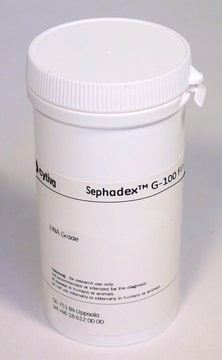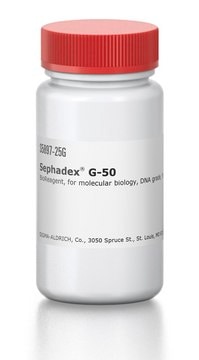Se connecterpour consulter vos tarifs contractuels et ceux de votre entreprise/organisme
Sélectionner une taille de conditionnement
Le tarif et la disponibilité ne sont pas disponibles actuellement.
A propos de cet article
Code UNSPSC :
41115722
Nomenclature NACRES :
NA.52
Passer à
Service technique
Besoin d'aide ? Notre équipe de scientifiques expérimentés est là pour vous.
Laissez-nous vous aiderConditionnement
pkg of 100 g
Fabricant/nom de marque
Cytiva 17-0574-02
Taille des particules
20-50 μm (dry)
Catégories apparentées
1 of 4
Cet article | GE17-0572-02 | S5897 | S6147 |
|---|---|---|---|
| manufacturer/tradename Cytiva 17-0574-02 | manufacturer/tradename Cytiva 17-0572-02 | manufacturer/tradename - | manufacturer/tradename - |
| packaging pkg of 100 g | packaging pack of 100 g | packaging - | packaging - |
| particle size 20-50 μm (dry) | particle size 20-80 μm (dry) | particle size - | particle size - |
Description générale
Sephadex™ G-100 DNA Grade is ideal for use in preparing spin columns for DNA purification.
Sephadex G-100 is one of five different G-types ranging from G-10 for small molecules to G-75 for larger molecules. Spin columns packed with Sephadex G-100 DNA Grade allow for high-recovery nucleic acid purification via gel filtration. Gel filtration resins do not exhibit a fixed exclusion limit when used in a spin-column format. In spin-column chromatography, the observed exclusion properties that allow the product to pass through the gel while the smaller impurities are retained depend on experimental factors, such as the resin used, sample volume, product size, and the g-forces used in the purification process.
Sephadex G-50 is a well-established gel filtration resin for desalting and buffer exchange of biomolecules >30 000 molecular weight, and with a spin protocol can be used for DNA and oligo purification of molecules greater than 20 bases in length. Sephadex G-25 has an exclusion limit of approximately Mr 5000, and when packed into empty MicroSpin columns, the resulting desalting columns can be used in a spin protocol for DNA and oligo purification of any DNA greater than 10 bases in length.
All these Sephadex types are therefore highly suitable for the purification of oligonucleotides or small DNA fragments following synthesis or in labeling applications.
Sephadex G-100 is one of five different G-types ranging from G-10 for small molecules to G-75 for larger molecules. Spin columns packed with Sephadex G-100 DNA Grade allow for high-recovery nucleic acid purification via gel filtration. Gel filtration resins do not exhibit a fixed exclusion limit when used in a spin-column format. In spin-column chromatography, the observed exclusion properties that allow the product to pass through the gel while the smaller impurities are retained depend on experimental factors, such as the resin used, sample volume, product size, and the g-forces used in the purification process.
Sephadex G-50 is a well-established gel filtration resin for desalting and buffer exchange of biomolecules >30 000 molecular weight, and with a spin protocol can be used for DNA and oligo purification of molecules greater than 20 bases in length. Sephadex G-25 has an exclusion limit of approximately Mr 5000, and when packed into empty MicroSpin columns, the resulting desalting columns can be used in a spin protocol for DNA and oligo purification of any DNA greater than 10 bases in length.
All these Sephadex types are therefore highly suitable for the purification of oligonucleotides or small DNA fragments following synthesis or in labeling applications.
Caractéristiques et avantages
- For DNA purification from small molecules by gel filtration in spin columns with an exclusion limit of 25bp ds DNA
- Tested to ensure reproducibly high recovery of DNA.
- Suitable for researchers who prefer to prepare their own columns for purifying nucleic acids.
- Sephadex® G-50 DNA Grade is used in illustra™ Autoseq™ G-50 columns, ProbeQuant™ G-50 Micro Columns, MicroSpin™ G-50 Columns, and NICK Column.
Notes préparatoires
Please be aware this product may be shipped 90 days before the expiration date. For more information on the batch specific expiration date, please contact technical service.
Remarque sur l'analyse
To view the Certificate of Analysis for this product, please visit www.cytiva.com.
Informations légales
AutoSeq is a trademark of Cytiva
MicroSpin is a trademark of Cytiva
ProbeQuant is a trademark of Cytiva
Sephadex is a registered trademark of Cytiva
illustra is a trademark of Cytiva
Produit(s) apparenté(s)
Réf. du produit
Description
Tarif
Code de la classe de stockage
13 - Non Combustible Solids
Faites votre choix parmi les versions les plus récentes :
Déjà en possession de ce produit ?
Retrouvez la documentation relative aux produits que vous avez récemment achetés dans la Bibliothèque de documents.
Notre équipe de scientifiques dispose d'une expérience dans tous les secteurs de la recherche, notamment en sciences de la vie, science des matériaux, synthèse chimique, chromatographie, analyse et dans de nombreux autres domaines..
Contacter notre Service technique


